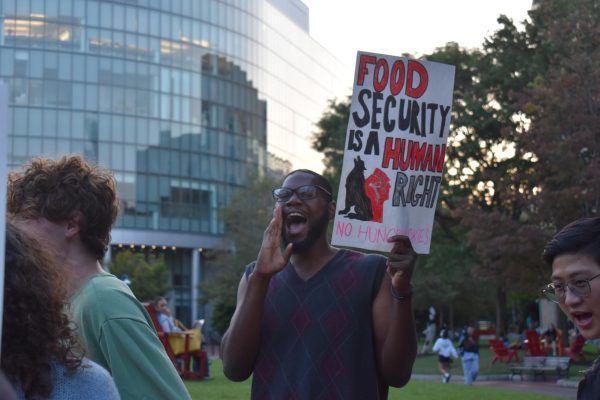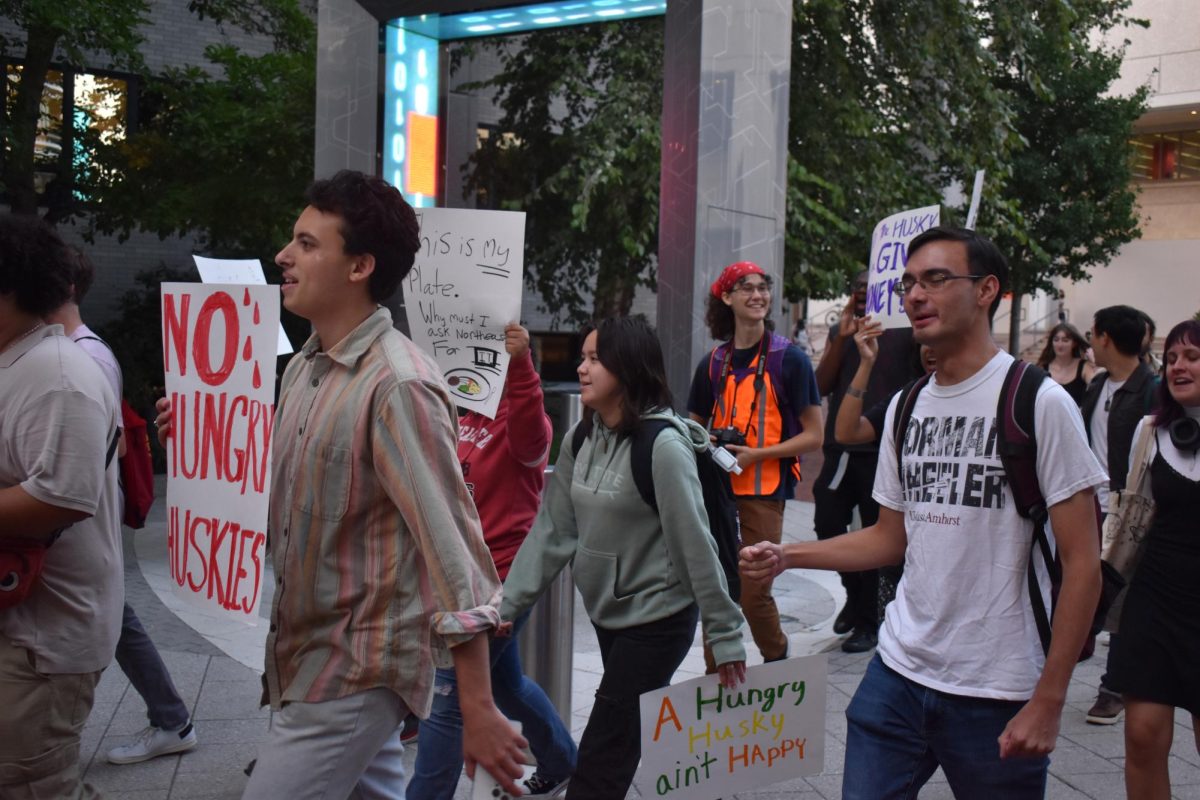In the middle of Centennial Common, about three dozen students gathered Sept. 21 with posters and a megaphone, ready to rally for the No Hungry Huskies campaign. As the common grew busy in the late afternoon, students began chanting into the megaphone: “What do we want? Three meals a day! When do we want it? Now!”
YDSA, or the Young Democratic Socialists of America, is a campus-oriented section of the Democratic Socialists of America, a nationwide organization. One of YDSA’s goals is to advocate for those who are affected by food insecurity in college. Northeastern’s YDSA chapter created the No Hungry Huskies campaign in an effort to end hunger on campus and to showcase that Northeastern has the means to do so with its $240 million revenue surplus.
Tobias Roberts, a second-year civil engineering major, shouted along to every chant as the rally made its way from the common, down Huntington Avenue and back through the heart of campus.
“This club speaks to what I want to change both on campus and with the university,” Roberts said.

YDSA, organized its third No Hungry Huskies rally in effort to maintain the traction the campaign has acquired since its start in 2020.
“The main thing is just to get the word out for all the freshmen and anyone else who just doesn’t happen to know about No Hungry Huskies,” said Carmen Phillips-Alvarez, a third-year criminal justice and political science combined major and chair of YDSA.
Phillips-Alvarez led the first No Hungry Huskies rally in February, where YDSA delivered to the university a petition with over 3,000 signatures supporting their initiative. The petition aimed to pressure Northeastern administration to modify meal plan costs so all students could afford at least one meal a day, however, YDSA has not made much progress due to the lack of communication from administration. In April, YDSA conducted their second rally in an effort to keep their momentum going from their first rally.
“None of us, unless you’re on the unlimited plan, can get three meals a day from the dining halls,” said Nicole Contreras, a third-year electrical and computer engineering combined major and vice chair of YDSA. “As a first-year you’re in a meal plan-required housing. You have no other option, really, unless it’s some extenuating circumstances.”
In Massachusetts, one in three college students suffer from food insecurity. At Northeastern, about 23% of students face some degree of food insecurity. As tuition increases every year, so does the cost of Northeastern’s meal plans. For one semester, a traditional 17-meals-per-week plan costs $4,090, with the unlimited meals-per-week plan costing $4,405. Under the 17-meal plan, each individual meal totals out to around $17 per meal. Additionally, if a student not on a meal plan were to swipe into the dining hall for dinner, the single swipe would cost $22.
“The school is getting bigger and bigger in name,” Contreras said. “I guess now it’s just a money game.”
While Northeastern does offer initiatives to help students struggling with food insecurity, such as Swipe2Care, some feel that Northeastern is still not doing enough. Swipe2Care is a program that gives current students the opportunity to donate their unused meal swipes at the end of the week, where they will then be distributed to students in need. However, many members of YDSA feel that the Swipe2Care system is flawed.
“It’s honestly incredibly angering that they try to put the starvation of students on other students who are also starving and struggling,” Phillips-Alvarez said. “It’s clear that the university is trying to pretend that they care about students. So then when there’s not enough swipes for Swipe2Care, it’s like, ‘Oh, it’s not our fault.’”
In the future, leadership will change within YDSA, but Phillips-Alvarez hopes that the transition between leadership will be smooth enough to keep the club’s momentum going.
“I think a big thing is that [the administration] views us as only temporary stakeholders in the university. They don’t take our wants or needs as seriously because we’re only going to be here for four or five years,” Phillips-Alvarez said. “My main goal is just to make sure that there are people to keep it running and to keep putting pressure on the university.”
The club hopes that spreading awareness will ultimately cause the change they are hoping to see.
“I hope to see administration be more open to student input,” Contreras said. “Especially because we’re the ones who are paying. It’s not only the pricing but also the quality of food, too. This is a whole big effort. It’s not just one little club.”











